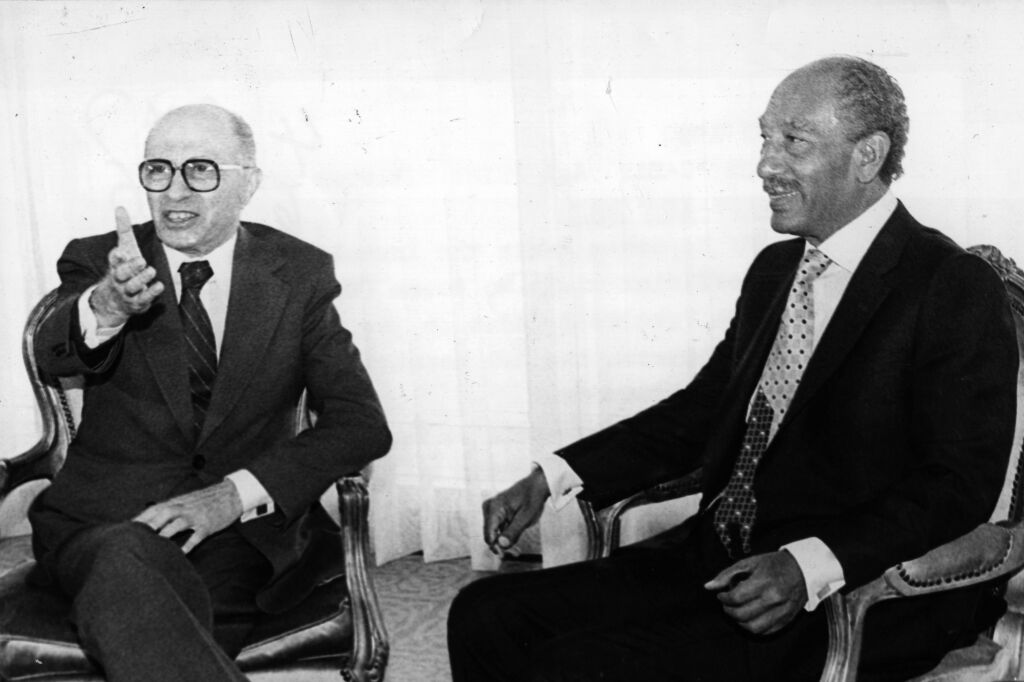
Egypt and Iran Ally Against Potential U.S. Military Action
Jan. 16, 1979, transformed the political dynamics of the Middle East. That is the date on which Ayatollah Khomeini overthrew the Shah Pahlavi of Iran, establishing an Islamist regime that would become the world’s number-one state sponsor of terror.
At this fateful hour, one man stood up to Iran for peace in the Middle East. Egyptian President Anwar Sadat had established a peace treaty with Israel the year before and went on to enrage Islamic radicals by personally speaking at a meeting of the Israeli Knesset.
How did Islamist Iran respond? Tehran severed all ties with Cairo in 1980. A year later, Sadat denounced the Ayatollah as a lunatic.
The Egyptian president was assassinated within days.
Diplomatic ties between Egypt and Iran have been frozen ever since—until now.
Egyptian Foreign Minister Ahmed Abul Gheit recently announced that Egypt and Iran will hold talks discussing the renewal of full diplomatic relations between Cairo and Tehran. Iranian President Mahmoud Ahmadinejad offered this past May to open an Iranian embassy in Cairo if Egypt would open an Egyptian embassy in Tehran. On September 18, Iranian delegates met with Egyptian officials in Cairo, and both sides officially agreed to resume dialogue.
The warming relationship between these two Middle Eastern states is best demonstrated by the Egyptian foreign minister’s declaration the day after the Iranian-Egyptian meetings. On September 19, Abul Gheit expressed Egypt’s full rejection of any military action against Iran.
“Egypt absolutely does not agree with solving the Iranian nuclear issue by force or any military action,” he said, adding, “Egypt supports peaceful settlement for this issue through negotiations which guarantee the Iranian right to a peaceful nuclear program.” Retired Egyptian Maj. Gen. Gamal Mazloum echoed the foreign minister’s convictions when he commented that the latest developments in the region dictated Egypt and Iran must come closer together, instead of regarding each other as enemies.
Cairo’s cooperation with Tehran will cement Iran as the king of the Middle East.
“Iran plays a key role in the region, whether we agreed to it or not,” Mazloum further commented. He stressed that if U.S. threats to attack Iran come into reality, they will negatively impact the Gulf states.
Amr Moussa, secretary general of the Arab League, said, “If the situation deteriorated and there was a real threat of war against Iran, the Arabs would adopt a unified stance against a war on Iran, which would pose a threat to the region as a whole.”
Egypt and most of the Arab world seems poised to stand behind Iran.
What a turn of events! Egypt has been a vital U.S. ally in the Middle East since the days of the Iranian revolution. Now, Cairo has resumed diplomatic relations with Tehran and is prepared to stand by the Iranians in the event of military intervention on the part of the U.S.—or, presumably, any other nation—to stop Iran’s nuclear ambitions.
Why the change? It appears Egypt is simply responding to the changing reality in the Middle East. With U.S. influence in the region declining and Iranian influence rising, apparently Cairo recognizes Iran as being a more important nation to remain on good terms with.
Where will this lead?
The Muslim Brotherhood, a political party in Egypt with strong ideological links to Iranian-sponsored radicalism, was established in 1928 as a way to preserve Egypt as an Islamic society while secular constitutional reforms took hold following the fall of the Ottoman Empire. Although the party is outlawed by the government of Egypt’s moderate president, Hosni Mubarak, Muslim Brotherhood candidates still managed to gain 88 of 454 seats in the Egyptian Parliament in December 2005 elections. This parliamentary grab was the result of President Mubarak finally relenting to U.S. pressure to make Egyptian elections more democratic.
The fact is, the people of Egypt are becoming increasingly Islamicized. President Mubarak has been the primary force holding back this trend for the past generation. Yet, at age 80 and with failing health, the question of what will happen when he is gone has become quite pressing.
As the Trumpetreported in June, “The present move toward alignment between [Egypt and Iran], should it occur under the rulership of Hosni Mubarak, will only presage a far stronger alliance likely to be cemented after he is gone.”
The dream of the Muslim Brotherhood is a radical Islamist Egyptian state. It so happens that such a state would be an invaluable ally to Iran.
In his book The Fight for Jerusalem, Dr. Dore Gold, former Israeli ambassador to the United Nations, wrote, “The even more militant offshoots of the Muslim Brotherhood in Egypt during the 1990s advanced the principle that the road to the liberation of Jerusalem must begin in Cairo. Their first priority was regime change in Egypt and the rest of the Arab world, so they directed their energies against the ‘near enemy’ around them.”
When President Mubarak passes from the scene, the Muslim Brotherhood may get the regime change it has been dreaming of. The already warming relationship between Cairo and the nation that assassinated its president has already brought this fulfillment much closer.
With Egypt at its side, Iran’s credentials as the undisputed king of the Middle East will grow even stronger. Then Tehran’s long-awaited dream of conquering Jerusalem and Israel will seem an immediate reality.
Trumpet editor in chief Gerald Flurry has predicted for over 13 years that Iran would be the king of the Middle East, and that we would witness an alliance take place between Iran and Egypt. “Daniel 11:42 implies that Egypt will be allied with the king of the south, or Iran. … This prophecy indicates that there would be a radical change in Egyptian politics!” (“Why We Cannot Win the War Against Terrorism,” November 2003).
Watch for this far-reaching change. To see how events in Egypt and the Middle East will ultimately lead to the glorious return of Jesus Christ, read The King of the South.
